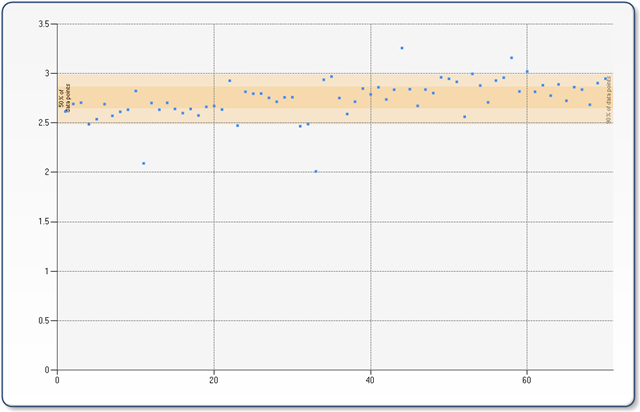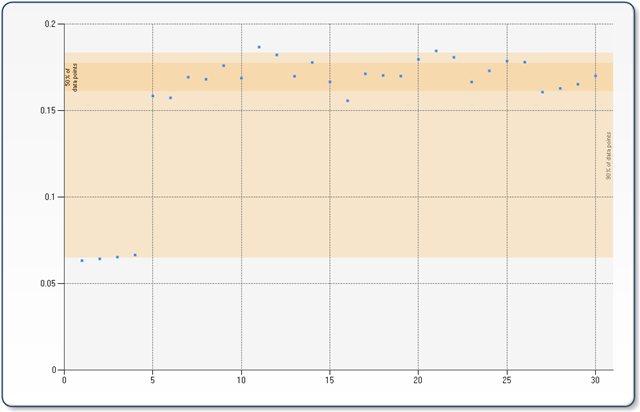Time to do some digging…
I’ve been getting my test harness and reporting tools setup for some performance baselining that I’m doing relative to cloud computing providers and when I left the office on Friday I set off a test that was uploading a collection of binary files (NetCDF files if you care) to an Azure container. I was doing nothing fancy… looping through a directory, for each file found, upload to the container using the defaults for BlobBlock and then record the duration (start/finish) for that file and the file size. The source directory contained 144 files representing roughly 58 GB of data. 32 of the files were roughly 1.5 GB each and the remainder were about 92.5 MB.
I came in this morning expecting to find the script long finished with some numbers to start looking at. Instead, what I found is that, after uploading some 70 files (almost 15 GB), every subsequent upload attempt failed with a timeout error – stating that the operation couldn’t be completed in the default 90-second time window. I started doing some digging into what was happening and so far have uncovered the following:
- By default, the Storage Client that ships with the November CTP breaks your file up into 4 MB blocks (assuming you are using BlobBlock – which you should if your file is over the 64 MB limit.
- The client then manages 4 concurrent threads uploading the data. as each thread completes, another is started – keeping four active most the entire time.
- At some point Saturday afternoon (just after 12 noon UTC), the client could no longer successfully upload a 4 MB file (block) in the 90 second window, and all subsequent attempts failed.
- I initially assumed that my computer had simply tripped up or that a local networking event caused the problem so I restarted the tool – only to find every request continuing to fail.
- I then began to wonder if the problem was the new storage client library (not sure why) so I pulled out a tool to manage Azure storage – Cloud Storage Studio (http://www.cerebrata.com/Products/CloudStorageStudio/Default.aspx) and noticed that I was able to successfully upload a file. I remembered that CSS (by default) splits the file into fairly small blocks, so I cracked open Fiddler and began monitoring what was going on. I learned that it was using 256 KB blocks (this is configurable via settings in the app).
- I then adjusted my upload script to set the ServiceClient.WriteBlockSizeInBytes property (ServiceClient is a property of the CloudBlockBlob object) to 256k and re-ran the script. This time, I had no troubles at all (other than a painfully slow experience).
- So, I can upload data (not a service outage) but while 256K blocks work, the 4 MB blocks that worked on Friday no longer work – I’m assuming that there’s a networking issue on my end, or something in the Azure platform. To provide more clarity, I adjusted the tool again, this time using a WriteBlockSizeInBytes value of 1MB and re-ran the tool – again, seeing successful uploads.
While this last step was running, I thought it might be good to go back and do some crunching on the data I had so far. The following chart represents the uploads rate from the files that successfully were uploaded on Friday/Saturday followed by the a chart showing the probability density. The mean rate was 2.74 mbits/sec with a standard deviation of 0.1968. It is interesting to note that there was no upward drift at the end of the collection of successful runs, indicating that more than likely, the “fault” was likely caused by something specific rather than being the result of a gradual shift or failure based on usage (imagine a scenario wherein as more data is populated in a container, indexes slow down, causing upload speeds to trail off).
Upload Speeds [click image for full size]
Probability Density [click image for full size]
I then ran similar reports against the data I from this morning’s runs. I’m still in the process of generating a full report on the data, but a representative sample shows the following: The mean upload rate was 0.15 mbits/sec with a standard deviation rate of 0.0375. This is over 17x slower than Friday. This data points represented below are for three batches – the first batch used a WriteBlockSizeInBytes of 256K, the second used 1MB, and the third used 2MB (10 points per size). The file upload did not succeed with the 2MB size – only finished about 1/4th of the full file.
Upload Speeds [click image for full size]
Probability Density [click image for full size]
I’ve seen a few comments from others today that indicate the slow down may be widespread – My next course of action is to attempt to run the tests from a few different locations to hopefully eliminate my local network as the problem set and have more data with which to address the issue.



